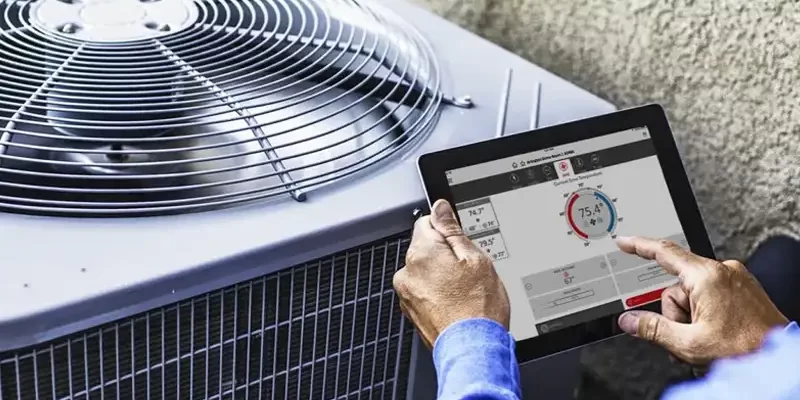In the rapidly evolving world of technology, AI for detecting refrigerant leaks has emerged as a game-changer in the HVAC industry. As industry QA professionals, understanding the profound impact of AI on leak detection is crucial. Not only does it enhance efficiency, but it also significantly reduces environmental harm caused by undetected leaks.

Understanding Refrigerant Leaks
Refrigerant leaks are a prevalent issue in HVAC systems, often leading to inefficient performance and environmental damage. These leaks occur when there is a break in the system’s sealed refrigerant loop, allowing the refrigerant gas to escape. This not only affects the system’s cooling efficiency but also contributes to global warming.
The Role of AI in Leak Detection
Artificial Intelligence, with its ability to analyze vast amounts of data quickly and accurately, is revolutionizing leak detection. By employing AI, companies can identify leaks early, preventing costly repairs and reducing environmental impact. AI systems use advanced sensors and algorithms to monitor HVAC systems continuously, ensuring that any deviation from normal operations is detected promptly.
How AI Technology Works
AI technology for leak detection involves the use of sophisticated sensors that gather data from the HVAC system. These sensors monitor various parameters such as pressure, temperature, and refrigerant levels. The collected data is then analyzed by AI algorithms to detect anomalies that indicate a leak. This process is much faster and more accurate than traditional methods, which often rely on manual inspections.
Benefits of AI in Refrigerant Leak Detection
The integration of AI in leak detection offers numerous benefits. Firstly, it significantly improves the accuracy of leak detection, reducing false positives and ensuring that maintenance teams focus on actual issues. Secondly, it enhances the efficiency of HVAC systems by ensuring they operate optimally without refrigerant loss. Lastly, it contributes to environmental protection by minimizing the release of harmful refrigerants into the atmosphere.
Cost Savings and Efficiency
AI-driven leak detection can lead to substantial cost savings for businesses. By identifying leaks early, companies can avoid expensive repairs and replacements. Additionally, maintaining optimal refrigerant levels ensures that HVAC systems operate efficiently, reducing energy consumption and lowering utility bills.
Environmental Impact
Refrigerants are potent greenhouse gases, and their release into the atmosphere contributes to global warming. AI technology helps mitigate this issue by detecting leaks early and preventing refrigerant release. This not only protects the environment but also ensures compliance with environmental regulations.
Industry Applications
The application of AI in refrigerant leak detection is not limited to residential HVAC systems. It extends to commercial and industrial systems, where the stakes are even higher. In large-scale operations, even minor leaks can lead to significant financial losses and environmental damage.
Case Studies
Several companies have successfully implemented AI technology for leak detection in their operations. For instance, a leading HVAC manufacturer reported a 30% reduction in maintenance costs after integrating AI into their leak detection processes. Similarly, a commercial building management company reduced their energy consumption by 20% by employing AI to maintain optimal refrigerant levels.
Challenges and Considerations
While AI offers numerous benefits, its implementation is not without challenges. One of the primary concerns is the initial cost of AI technology. However, the long-term savings and efficiency gains often justify this investment. Additionally, companies must ensure that their staff is adequately trained to use AI systems effectively.
Future of AI in HVAC
The future of AI in the HVAC industry looks promising. As technology continues to advance, AI systems will become more sophisticated, offering even greater accuracy and efficiency. Companies that adopt AI technology early will have a competitive edge, benefiting from reduced costs and enhanced sustainability.
Conclusion
In conclusion, AI for detecting refrigerant leaks is a transformative technology that offers numerous benefits to the HVAC industry. By enhancing the accuracy and efficiency of leak detection, AI helps reduce costs, protect the environment, and ensure compliance with regulations. As the technology continues to evolve, its impact on the industry will only grow, making it an essential tool for businesses and professionals alike.

FAQs
What are refrigerant leaks?
Refrigerant leaks occur when there is a breach in the HVAC system’s sealed refrigerant loop, allowing the refrigerant gas to escape. This can lead to inefficient performance and environmental damage.
How does AI detect refrigerant leaks?
AI detects refrigerant leaks by using sensors to monitor various parameters of the HVAC system. These sensors gather data, which is then analyzed by AI algorithms to identify anomalies that indicate a leak.
What are the benefits of using AI for leak detection?
Using AI for leak detection offers several benefits, including improved accuracy, cost savings, enhanced efficiency, and reduced environmental impact.
For more insights on how AI is shaping the HVAC industry, you can visit AI Transforming HVAC.
Additionally, learn more about the impact of AI on HVAC systems by exploring Thermal Imaging AI.
This article contains affiliate links. We may earn a commission at no extra cost to you.
